In Malaysia, public hospitals bear the weight of a healthcare system stretched thin. While services are heavily subsidized, the surging demand from lower-income communities—especially the B40 group (households earning below RM4,850/month, representing 40% of the population)—has led to long waiting times and limited access to timely treatments. Meanwhile, private healthcare remains financially out of reach for many. In a bold and compassionate move, Management and Science University (MSU), through its MSU Medical Centre (MSUMC), in partnership with the Ministry of Health (MOH), introduced the HEART programme (Health Equity for Affordable and Rapid Treatment) in April 2024. Funded entirely by the MSU Foundation, HEART is a first-of-its-kind Public Wing in a private hospital, flipping the traditional model where public hospitals typically serve full-paying patients in Private Wings. Supporting UN Sustainable Development Goals—SDG 3 (Health), SDG 9 (Innovation), SDG 11 (Sustainable Cities), and SDG 17 (Partnerships), HEART provides free surgical services—including hernia and gallbladder procedures—with first-class accommodation to the underserved. It collaborates with five public hospitals (TAR, Shah Alam, Sultan Idris, Ampang, Selayang) and is backed by a dedicated team of 6 surgeons and 7 anaesthetists. To date, 200 surgeries have been successfully conducted under MOH oversight. HEART relieves pressure on public hospitals by transferring high-volume, low-risk surgeries to MSUMC, leveraging flexible specialist schemes, and offering fixed-cost service bundles. It also incentivizes public sector specialists to contribute within private settings while continuing their government service—nurturing cross-sector synergy and optimizing scarce medical talent. Lauded by the Health Minister as a milestone in public-private partnerships, HEART does more than heal bodies—it restores dignity, accelerates care, and redefines what healthcare equity can look like when compassion leads the way.

RUNNER-UP
SDG Impact Award Award
Management and Science University - Healthcare Equity for Affordable and Rapid Treatment (HEART).
RUNNER-UP SDG Impact Award Award
Peoples' Choice Category Winner
Management and Science University, Malaysia - Malaysia
"Reimagining Healthcare Access through Public-Private Partnerships"

Engage on social media
(Official President MSU Twitter)
(Official MSU Twitter account)
(Official MSU Youtube)
(Official President MSU Facebook)
Have a say and vote for this entry to win the People's Choice Award!
500 points per vote
Provide your email address and click on "vote". You will then receive an email that enables you to verify your vote by clicking on a link.
1500 points for each share/re-post; 500 points for each like
This entry has not provided any social media links for community voting.
Summary
Key People

Prof. Tan Sri Dr Mohd Shukri Ab Yajid
President-Founder
Management and Science University

Prof. Puan Sri Dr Junainah Abd Hamid
Vice Chancelor
Management and Science University

Dato’ Nasharuddin Shukor
Chief Executive Officer
MSU Medical Centre,
Management and Science University
Acknowledgements
MSU would like to express its gratitude to the Ministry of Health for its support and confidence in this inaugural and innovative Public-Private Partnership that has created a new landmark in access to affordable and rapid healthcare treatment to the under-privileged communities.
MSU also express its heartfelt thanks to the President of MSU for his visionary leadership in leading and guiding the team from the conception of ideas until its realization and for his unwavering commitment towards the sustainability of this programme.
Images
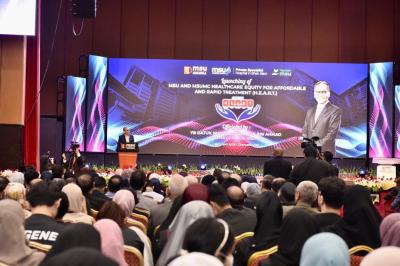
Launching of HEART SDG Initiative
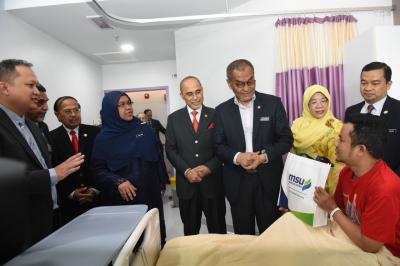
Minister of Health visits HEART Patient
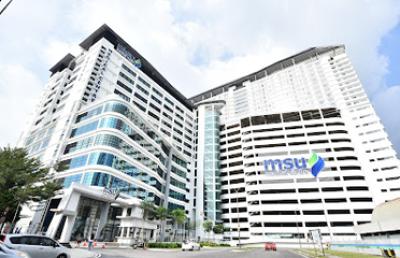
MSU Medical Centre
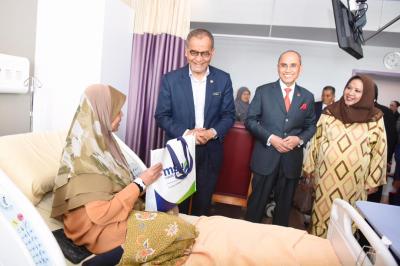
Minister of Health visits HEART Patient
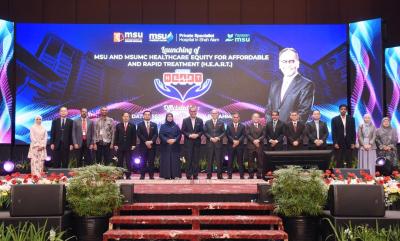
Representatives from participating public hospitals for HEART SDG Initiative
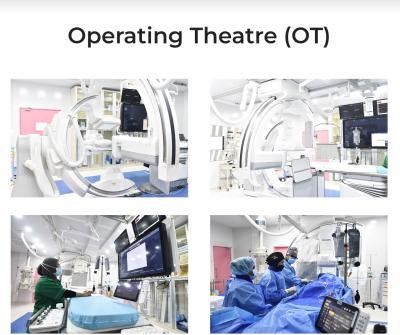
Operating Theaters
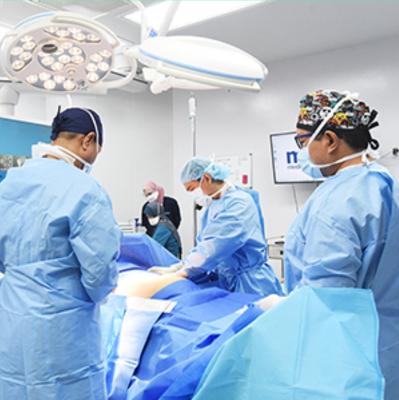
Operation in progress
IMPACT STORY
Impacting lifes
The HEART programme enables selected economically challenged patients to be monitored and treated at the MSUMC with the costs borne by MSU Foundation. The impact of this collaboration is:
1. Reduce waiting time for common surgical procedures in public hospitals
2. Incentivize government specialist doctors for their services
3. Selectively offloading high volume low risk cases from government hospitals to MSUMC
4. Capitalize the flexi scheme of Medical Specialist providers
5. Bundling costs of service into packages with a fixed cost
MSUMC becomes a cluster hospital and buffer zone for 5 major public hospitals: Tengku Ampuan Rahimah Hospital, Shah Alam Hospital, Sultan Idris Hospital, Ampang Hospital and Selayang Hospital for handling specific health cases requiring surgery. Among the free surgical services completed include inguinal hernia repair and laparoscopic cholecystectomy (gall bladder removal). Other services provided include first-class ward accommodation and coverage of other surgical costs.
Two hundred (200) operative procedures have been successfully conducted by the team. It is targeted that the team with the available facilities and scheduling at MSUMC, will be able to manage on average of 50 cases monthly (600 cases annually). To-date the surgical procedures managed by the Team involves 120 cases for Laparoscopic Cholecystectomy and 80 cases for Laparoscopic/Open Hernioplasty.
Nine anesthetists and six surgeons from MSUMC and MOH are involved in this collaboration. The selection, assessment and long-term follow-up of patients under HEART will be overseen by the Ministry of Health.
LEARNINGS
Lessons learned
Public-private partnerships (PPPs) have evolved beyond financing tools—they are now powerful mechanisms for transforming healthcare access. By harnessing the strengths of both sectors, PPPs can deliver scalable, cost-effective solutions for underserved communities, while ensuring long-term sustainability for private partners.
However, healthcare PPPs are complex. They demand tailored strategies, shared decision-making, and strong accountability to balance public good with private interests.
The MSU HEART Programme, launched on April 25, 2024 by Malaysia’s Health Minister, exemplifies an innovative PPP model. A collaboration between MSU Medical Centre (MSUMC) and the Ministry of Health (MOH), HEART integrates private hospital capacity with public healthcare efforts. It addresses critical issues like long surgical wait times, service bottlenecks, and talent gaps by offloading selected procedures to MSUMC—free of charge for patients, funded entirely by the MSU Foundation.
This cluster hospital model supports five major public hospitals and delivers specialized procedures such as hernia repairs and gall bladder removals, reducing pressure on overstretched public facilities. With 212 private hospitals (19,000 beds) vs 149 public hospitals (46,000 beds), the imbalance is stark—and PPPs offer a bridge.
HEART’s success shows that private universities can play a key role in public healthcare. If adopted widely—with private hospitals focusing on different specialties—this model can reshape healthcare delivery.
Though profit motives may deter some, institutions like MSU prove that mission-driven care, supported by public and private donors, can expand access and restore dignity to those in need.
FUTURE PLANS
What's coming?
Public-Private Partnerships are complex and require a customized approach for each project. Successful PPPs must balance the interests of both parties, establish clear decision-making processes, and ensure accountability. The challenge of creating an effective and sustainable healthcare PPP is significant. Tripartite agreement and commitment between government, public and private hospitals is a key success factor.
The strain on public hospitals is significant due to high patient volumes. The Ministry of Health operates 149 hospitals with nearly 46,000 beds, while the private sector has 212 hospitals with just under 19,000 beds. The PPP cluster hospital model can help relieve this pressure, making healthcare more accessible to economically disadvantaged individuals. Each private hospital can specialize in different medical treatments, ensuring efficient distribution of cases and reducing duplication of services. This approach will result in cost-effective and efficient medical care, particularly benefiting lower-income patients.
The model's replicability may be challenged by the profit-driven nature of many private hospitals. However, in the case of MSU, a not-for-profit institution, the PPP initiative is fully funded by the MSU Foundation via internal fundings and endowments from public and business communities to ensure sustainability.
MSU plans to continue its PPP model within its financial capabilities and area of specialization with a targeted 600 surgical cases annually. MSU is currently collaborating with the government to establish a Policy Paper specifically on PPP in Healthcare sector to address the challenges in healthcare services and to encourage other private healthcare providers to adopt MSU’s PPP model.

